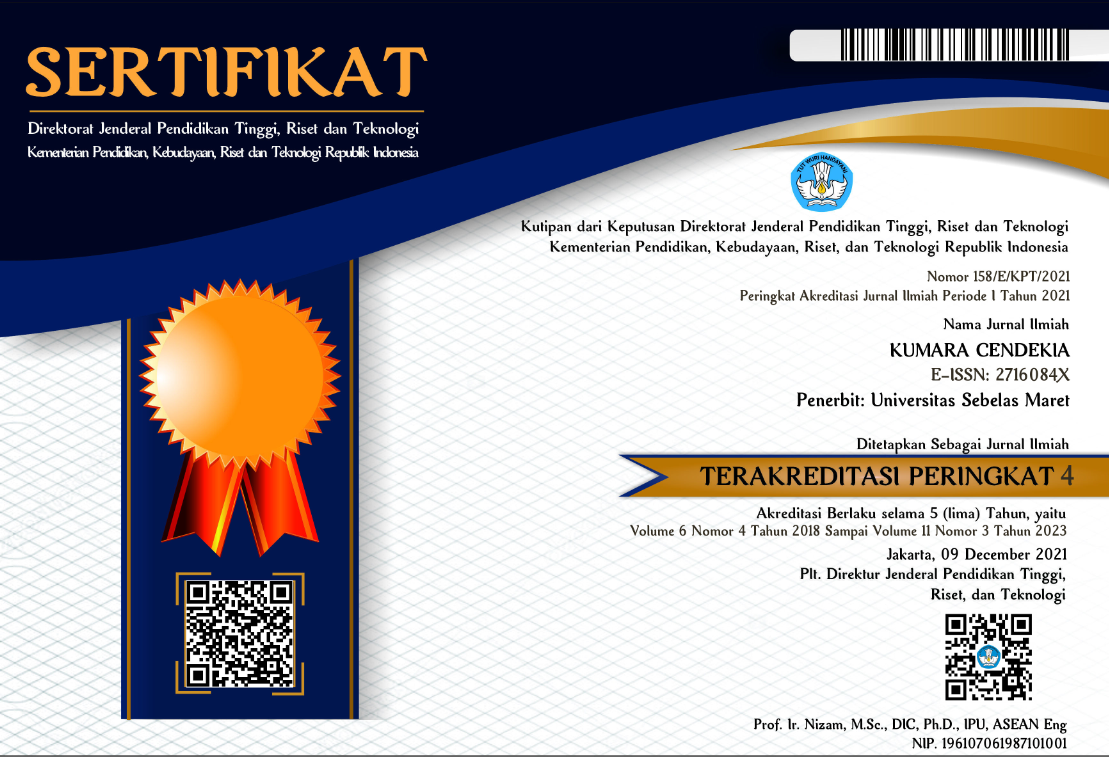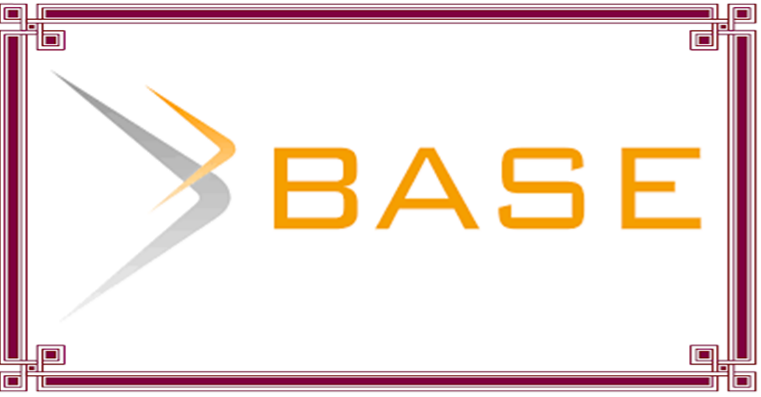TREN PENELITIAN PENDIDIKAN ANAK USIA DINI UNTUK PEMBELAJARAN STEM: SEBUAH STUDI LITERATUR SISTEMATIS
Abstract
Penelitian ini bertujuan untuk mengidentifikasi dan menganalisis tren penelitian dalam pendidikan anak usia dini yang berkaitan dengan pembelajaran STEM melalui tinjauan literatur sistematis. Studi ini mengikuti pedoman PRISMA dan menggunakan kerangka kerja PICO sebagai dasar pendekatan analisis. Data diperoleh dari database Scopus dan ERIC, kemudian dianalisis secara bibliometrik menggunakan perangkat lunak VOSviewer dan secara tematik dengan bantuan NVivo 12. Hasil analisis mengungkapkan lima klaster utama dalam literatur: perkembangan anak dan pembelajaran berbasis bermain, pengembangan profesional guru, efektivitas program STEM, pengembangan kurikulum, serta integrasi seni dan teknologi pendidikan. Temuan menunjukkan bahwa meskipun minat terhadap pendidikan STEM pada anak usia dini terus meningkat, masih terdapat kesenjangan signifikan, terutama terkait efektivitas implementasi dan dukungan sistematis bagi pendidik. Implikasi dari studi ini menekankan pentingnya pendekatan berbasis bukti dalam pengembangan kurikulum, pelatihan guru, dan kebijakan pendidikan guna memperkuat integrasi STEM sejak usia dini.
Keywords
Full Text:
PDFReferences
Abdallah, A. K., & Alkaabi, A. M. (2023). Induction Programs’ Effectiveness in Boosting New Teachers’ Instruction and Student Achievement: A Critical Review. International Journal of Learning, Teaching and Educational Research, 22(5), 493–517. https://doi.org/10.26803/ijlter.22.5.25
Abramzon, N. (2017). Improving the Attitude of Pre-service Elementary School Teachers Towards Teaching Physics. International Journal of Elementary Education, 6(3), 16. https://doi.org/10.11648/j.ijeedu.20170603.11
Alsina, Á., Cornejo-Morales, C., & Salgado, M. (2021). Argumentación en la matemática escolar infantil: Análisis de una actividad STEM usando la Situación Argumentativa en Conexión Interdisciplinar. Avances de Investigación En Educación Matemática, 20, 141–159. https://doi.org/10.35763/aiem20.3999
Ata Aktürk, A., Demircan, H. özlen, Şenyurt, E., & Çetin, M. (2017). Turkish early childhood education curriculum from the perspective of STEM education: A document analysis. Journal of Turkish Science Education, 14(4), 16–34. https://doi.org/10.12973/tused.10210a
Avolio, B., Paucar-Menacho, L. M., & Pretell, C. (2023). Formation and Consolidation of Research Seedbeds: A Systematic Literature Review. International Journal of Learning, Teaching and Educational Research, 22(4), 286–309. https://doi.org/10.26803/ijlter.22.4.17
Cabello, V. M., Loreto Martínez, M., Armijo, S., & Maldonado, L. (2021). Promoting STEAM learning in the early years: “Pequeños Científicos” Program. Lumat, 9(2), 33–62. https://doi.org/10.31129/lumat.9.2.1401
Campbell, C., & Speldewinde, C. (2022). Early Childhood STEM Education for Sustainable Development. Sustainability (Switzerland), 14(6). https://doi.org/10.3390/su14063524
Chamorro-Atalaya, O., Durán-Herrera, V., Suarez-Bazalar, R., Gonzáles -Pacheco, A., Quipuscoa-Silvestre, M., Hernández-Hernández, F., Huaman-Flores, E., Chaccara-Contreras, V., Palacios-Huaraca, C., & Guía-Altamirano, T. (2023). The Metaverse in University Education during COVID-19: A Systematic Review of Success Factors. International Journal of Learning, Teaching and Educational Research, 22(5), 206–226. https://doi.org/10.26803/ijlter.22.5.10
Chen, Y. L., & Tippett, C. D. (2022). Project-Based Inquiry in STEM Teaching for Preschool Children. Eurasia Journal of Mathematics, Science and Technology Education, 18(4). https://doi.org/10.29333/ejmste/11899
Collado, E. (2004). Language learning. Language Teaching, 37(1), 53–61. https://doi.org/10.1017/S0261444804222133
DeJarnette, N. K. (2018). Implementing STEAM in the Early Childhood Classroom. European Journal of STEM Education, 3(3), 1–9. https://doi.org/10.20897/ejsteme/3878
Dejonckheere, P. J. N., De Wit, N., Van de Keere, K., & Vervaet, S. (2016). Exploring the classroom: Teaching science in early childhood. International Electronic Journal of Elementary Education, 8(4), 537–558. https://doi.org/10.12973/eu-jer.5.3.149
Donegan-Ritter, M., & Kohler, F. W. (2017). Preparing Early Childhood Educators for Blending Practices in Inclusive Classrooms. Journal of the American Academy of Special Education Professionals, April, 104–117.
ElSayary, A., Zein, R., & Antonio, L. S. (2022). Using Interactive Technology to Develop Preservice Teachers’ STEAM Competencies in Early Childhood Education Program. Eurasia Journal of Mathematics, Science and Technology Education, 18(2). https://doi.org/10.29333/EJMSTE/11649
Gerosa, A., Koleszar, V., Tejera, G., Gómez-Sena, L., & Carboni, A. (2022). Educational Robotics Intervention to Foster Computational Thinking in Preschoolers: Effects of Children’s Task Engagement. Frontiers in Psychology, 13(June). https://doi.org/10.3389/fpsyg.2022.904761
Guleria, D., & Kaur, G. (2021). Bibliometric analysis of ecopreneurship using VOSviewer and RStudio Bibliometrix, 1989–2019. Library Hi Tech, 39(4), 1001–1024. https://doi.org/10.1108/LHT-09-2020-0218
Hassan, M. N., Abdullah, A. H., Ismail, N., Norbazilah, S., Suhud, A., & Hamzah, M. H. (2019). Mathematics curriculum framework for early childhood education based on science , technology, engineering and mathematics (STEM). International Electronic Journal of Mathematics Education, 14(1), 15–31. https://doi.org/10.12973/iejme/3960
Jiang, L. (2022). Development and Implementation Path of Kindergarten Stem Educational Activities Based on Data Mining. Computational Intelligence and Neuroscience, 2022. https://doi.org/10.1155/2022/2700674
John, M.-S., Sibuma, B., Wunnava, S., Anggoro, F., & Dubosarsky, M. (2018). An Iterative Participatory Approach to Developing an Early Childhood Problem-based STEM Curriculum. European Journal of STEM Education, 3(3). https://doi.org/10.20897/ejsteme/3867
Lewis Presser, A. E., Young, J. M., Clements, L. J., Rosenfeld, D., Cerrone, M., Kook, J. F., & Sherwood, H. (2022). Exploring Preschool Data Collection and Analysis: A Pilot Study. Education Sciences, 12(2). https://doi.org/10.3390/educsci12020118
Liu, X., & Trent, J. (2023). Being a Teacher in China: A Systematic Review of Teacher Identity in Education Reform. International Journal of Learning, Teaching and Educational Research, 22(4), 267–293. https://doi.org/10.26803/ijlter.22.4.15
Mkosi, N. N., Mavuso, M. P., & Olawumi, K. B. (2023). Using Ubuntu Values in Integrating African Indigenous Knowledge into Teaching and Learning: A Review of Literature. International Journal of Learning, Teaching and Educational Research, 22(5), 140–159. https://doi.org/10.26803/ijlter.22.5.7
Moore Saggese, J. (2019). Keeping It Real. Art Journal, 78(4), 5. https://doi.org/10.1080/00043249.2019.1684104
Yulianti, E., Sutarto, J., & Sugiyo. (2019). Sentra Nasima Learning Strategies to Enhance Religious Nationalist Characters in Kindergarten. Journal of Primary Education, 8(69), 238–247. https://doi.org/10.15294/jpe.v8i3.26489
Refbacks
- There are currently no refbacks.












